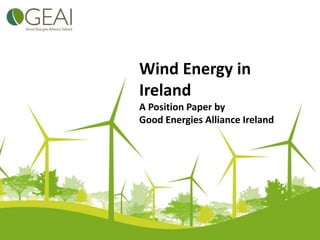Presentation of Position Paper GEAI
- 1. Wind Energy in Ireland A Position Paper by Good Energies Alliance Ireland
- 2. 16 March, 2015 2 Do you knowŌĆ” In Ireland: ŌĆó 85% of our energy comes from fossil fuels - 90% of which is imported ŌĆó In 2012, IrelandŌĆÖs import bill was estimated at Ōé¼6.5 billion and the use of the fossil fuels was responsible for 58 million tons of CO2 emissions ŌĆó By November 2014 the Republic of Ireland had 182 wind farms, with a total installed capacity of 2190MW
- 3. 16 March, 2015 3 The Thesis of our study The development of wind energy is an essential part of the decarbonisation of energy production in Ireland but such developments must have genuine benefits for and buy-in from the Irish people.
- 4. 16 March, 2015 4 Wind energy ŌĆō main arguments against ŌĆó Few benefits for the local communities ŌĆó No consultation during the planning process ŌĆó Wind energy is intermittent ŌĆó Wind turbines impact people, the environment and the wildlife
- 5. 16 March, 2015 5 Wind energy ŌĆō counter-arguments for Each argument against wind energy was analysed in detail and answered. In addition we found study cases: ŌĆó Isle of Gigha, Scotland ŌĆó Languedoc-Roussillon Region, France ŌĆó Rheinland-Pfalz Region, Germany ... and drew conclusions from them!
- 6. 16 March, 2015 6 We agree with the Thesis ŌĆ£The development of wind energy is an essential part of the decarbonisation of energy production in Ireland but such developments must have genuine benefits for and buy-in from the Irish people.ŌĆØ It is supported by the three pillars of sustainable development: 1. Social implications, 2. Economic gains and 3. Environmental protection.
- 7. 16 March, 2015 7 Social implications Involving the people in project planning leads to greater acceptance. Where the community has a real stake in the project, it gets people more involved in community life. Community ownership leads to community pride!
- 8. 16 March, 2015 8 Economic gains Wind energy substitutes for fossil fuels. For the 2010 ŌĆō 2014 period: ŌĆó wind generation meant Ōé¼1 billion less spend on energy imports ŌĆó 12 million tones reduction in CO2 emissions Wind energy projects can give revenue to local communities and will create many jobs.
- 9. 16 March, 2015 9 Environmental protection Wind energy will: ŌĆó reduce carbon emissions in Ireland and combat global warming. ŌĆó reduce air pollution, which globally is the 6th leading cause of death. ŌĆó cause less negative impact environmentally than fossil fuel power plants.
- 10. 16 March, 2015 10 What we learned! ŌĆó A collaborative planning process is essential in Ireland for wind energy projects to be acceptable to communities ŌĆó Communities must get real benefits ŌĆó The more wind power, the more constant the electricity output ŌĆó Noise and visual impact are generally subjective
- 11. 16 March, 2015 11 GEAI Position GEAI supports the future development of wind energy and considers that the development of wind energy, both on-shore and off-shore, is an essential part of the decarbonisation of energy production in Ireland. However, GEAI believes that wind energy projects must include a fully consultative planning process involving different stakeholders in the development process; and also must include genuine benefits for the Irish people and, in the case of on-shore developments, local communities. GEAI fully supports and encourages community ownership of wind energy projects and small neighbourhood wind energy projects.











